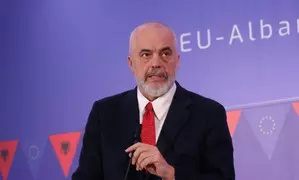Albania to lower electricity price

Tirana, Jan 9 Albania will reduce household electricity prices by 1 Albanian lek (0.01 US dollar) to 8.5 lek per kilowatt-hour between February 1 and December 31, Prime Minister Edi Rama announced.
Speaking at a press conference on Wednesday, Rama highlighted that this marks the first electricity price reduction in Albania in 35 years.
According to the new price system set by the Energy Regulatory Authority, from February 1, households consuming up to 700 kilowatt-hours will pay 8.5 lek per kilowatt-hour (excluding VAT), while households exceeding that threshold will pay 9.5 lek per kilowatt-hour, reports Xinhua news agency.
Rama attributed the price cut to economic growth and the government's efforts to share the benefits of reforms with citizens. "This is a carefully considered measure, thoroughly discussed at all levels," Rama said.
He reiterated Albania's commitment to diversifying energy sources as part of the nation's strategic plan to achieve full energy sovereignty. "In total, we aim to reach the target of 30 per cent of total energy production from non-hydro sources," Rama added.
Deputy Prime Minister and Minister of Infrastructure and Energy Belinda Balluku said that Albania is focused on maintaining its leadership in renewable energy production among Balkan countries. She expressed confidence that Albania will become a net energy exporter by 2029. (1 Albanian lek = 0.010 US dollar)
However, the Opposition criticised the government's decision to reduce electricity prices, calling it a measure that disproportionately benefits the wealthy.
Opposition leader Sali Berisha asserted that lowering prices equally for all households consuming up to 700 kWh ignores income disparities, leaving lower-income families with minimal relief.
"This move means the rich get richer, and the poor stay where they are," Berisha said, accusing Rama of implementing policies that suit his interests.
He suggested proportional price reductions on the basis of income levels, stressing the necessity of supporting small businesses and families with modest earnings.
Source: IANS